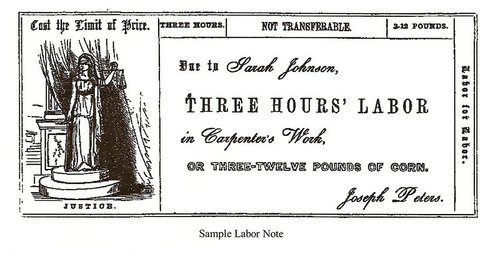Still working to recover. Please don't edit quite yet.
Difference between revisions of "Labor note"
From Anarchopedia
Joel.davis (Talk | contribs) (→See also) |
(→Disadvantages) |
||
| Line 16: | Line 16: | ||
* When the labor note is not validated by a trusted third party, the seller is required to verify the identity of the payer. | * When the labor note is not validated by a trusted third party, the seller is required to verify the identity of the payer. | ||
* Somewhat like [[banknote]]s, labor notes may imply a certain amount of [[bureaucracy]], not present in a [[gift economy]]. | * Somewhat like [[banknote]]s, labor notes may imply a certain amount of [[bureaucracy]], not present in a [[gift economy]]. | ||
| + | • Labor notes and associated labor-only prices do not signal short-term oversupply or short-term undersupply of goods, and may delay long-term adjustment of supply. | ||
===See also=== | ===See also=== | ||
Revision as of 21:02, 21 January 2008
A labor note is technically a written promise to perform a given amount of labor. Labor notes have been promoted by Josiah Warren in his labor-for-labor payment experiments.
Warren's labor notes used hours of labor as a base unit.

Sample labor note provided by Warren in Equitable Commerce
Advantages over other systems
- The currency is debasement-free. Central banks cannot print labor notes, nor they can be mined. A labor note thus will not devalue over time.
- Central banking as with bank-notes is unnecessary. Individuals are allowed to create debit, up to a limit which may be decided by the local community. There is no usury or charging of interest for a debit.
- Allow labor-for-labor, instead of labor-for-money payment, reducing the chances of exploited labor.
Disadvantages
- Presently, not a commonly recognized form of payment.
- When the labor note is not validated by a trusted third party, the seller is required to verify the identity of the payer.
- Somewhat like banknotes, labor notes may imply a certain amount of bureaucracy, not present in a gift economy.
• Labor notes and associated labor-only prices do not signal short-term oversupply or short-term undersupply of goods, and may delay long-term adjustment of supply.